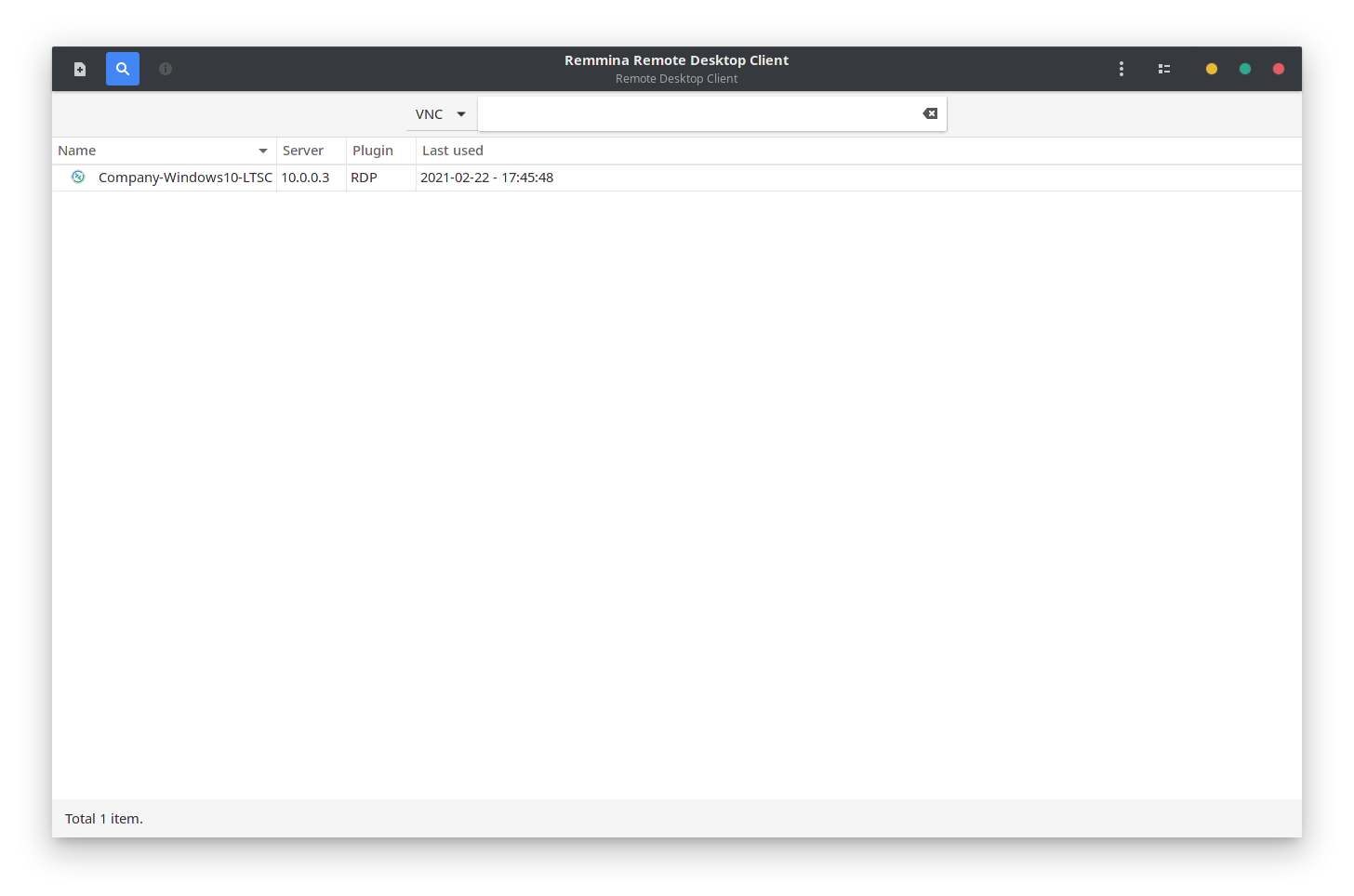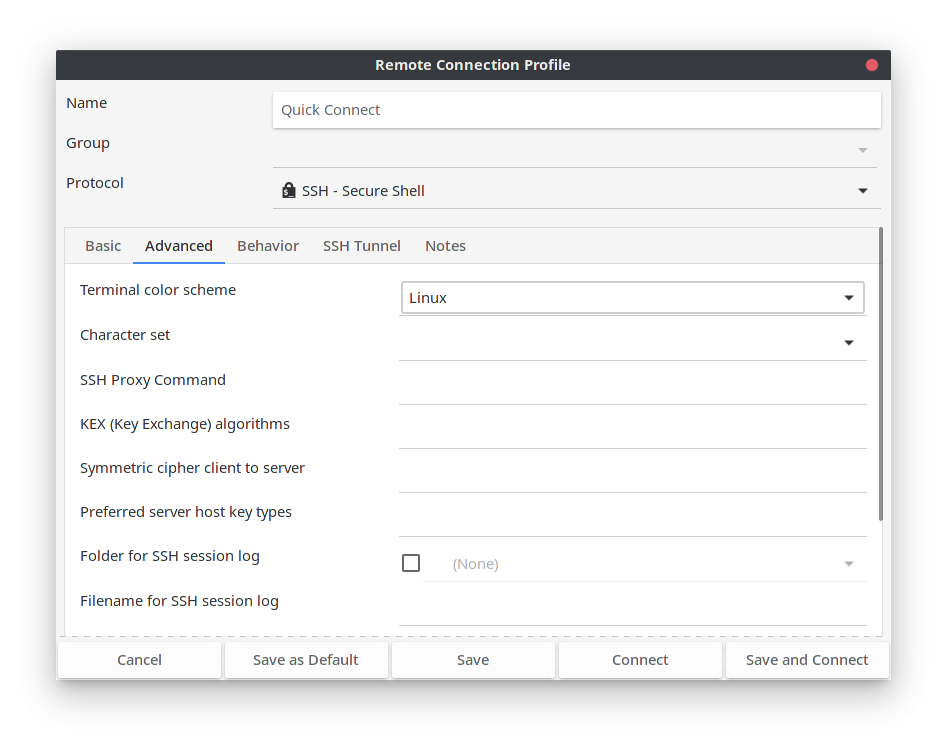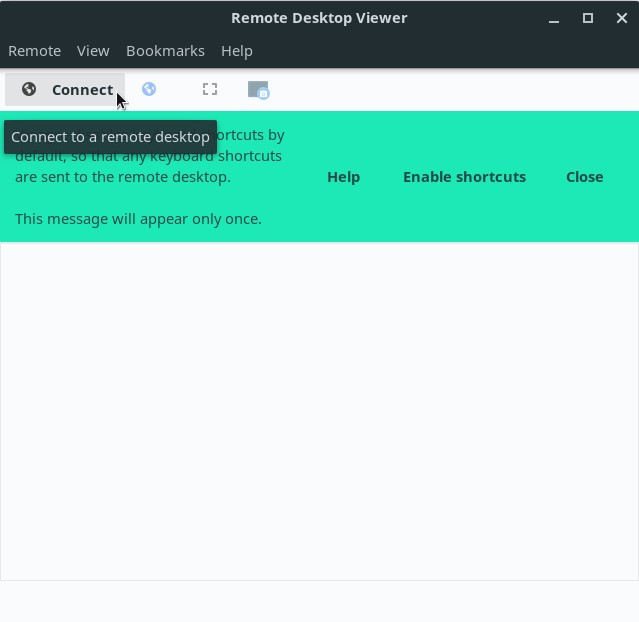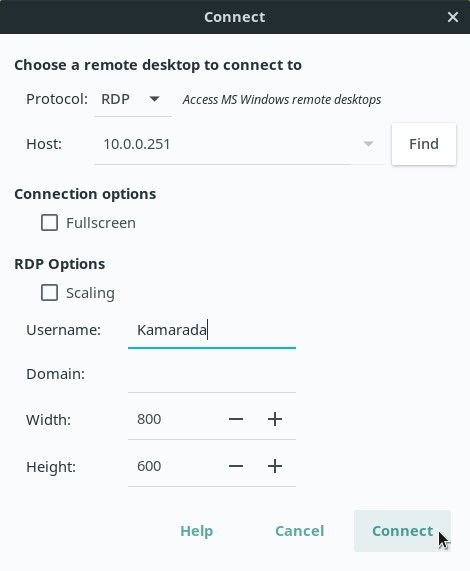

作者:E4b9a6, 创建:2023-02-23, 字数:25785, 已阅:723, 最后更新:2023-02-23
使用Linux发行版最不方便的地方就是缺少一些软件,借助远程桌面工具我们可以很方便的远程Windows来解决常用软件缺失的问题
对于远程桌面,个人需求是
这些都是原生RDP协议就可以做到的,我自己使用的Linux发行版是Manjaro系统,桌面环境选择的是Gnome3
在Linux下远程Windows可以使用基于RDP协议的软件如最常见的Remmina以及Gnome桌面下的Vinagre软件、Rdesktop软件等
Use other desktops remotely, from a tiny screen or large monitors.
官网链接:https://remmina.org/contributing-to-remmina/
remmina是我最喜欢的远程桌面软件之一,功能非常全面,支持的协议包括但不限于RDP、VNC、SPICE、NX、XDMCP、SSH等等,同时也兼顾非常优秀的界面

支持非常复杂的远程协议配置选项

各个操作系统的安装方式可以参考官方Wiki文档 - How to install remmina
Manjaro下安装Remmina非常简单,只需要使用
sudo pacman -S remmina
# 如果要支持RDP协议,则需要安装FreeRDP
sudo pacman -S freerdp
在我看来,Remmina的优点如下
Remmina是一个极其优秀的软件,我放弃使用的原因只有一个,那就是他在Gnome桌面下的表现糟糕
基于以上表现,在使用过1年多后,我最终还是放弃了这个非常优秀的远程客户端
如果你没有使用过Linux下的远程桌面客户端,那我非常强烈推荐使用Remmina,他在大多数发行版上表现还是非常稳定的
Vinagre is a VNC, SSH, RDP and SPICE client for the GNOME desktop environment.
Vinagre是基于GNOME桌面环境的一款支持多种远程协议客户端,根据实际体验来看,可以看成是一款剔除掉复杂配置部分的remmina
界面也是相对简洁,跟remmina外观差别不大


其支持自定义话配置少,优点是上手快,缺点是过于简单的配置在应对一些复杂的远程协议配置时无能为力
例如RDP验证方式更改为冷门方式则有可能无法使用这个软件进行连接
对于打印机/音频资源播放选项的支持目前版本也是缺失的
官方文档:Apps/vinagre - Gnome
所以这个软件如果需求只是简单偶尔远程下远程桌面,那么他还是可以胜任的
rdesktop is an open source UNIX client for connecting to Windows Remote Desktop Services, capable of natively speaking Remote Desktop Protocol (RDP) in order to present the user's Windows desktop.
rdesktop是一款开源的UNIX客户端,仅支持RDP协议,也支持复杂的协议配置,使用-h可以看到支持配置的选项非常多
rdesktop: A Remote Desktop Protocol client.
Version 1.9.0. Copyright (C) 1999-2016 Matthew Chapman et al.
See http://www.rdesktop.org/ for more information.
Usage: rdesktop [options] server[:port]
-u: user name
-d: domain
-s: shell / seamless application to start remotely
-c: working directory
-p: password (- to prompt)
-n: client hostname
-k: keyboard layout on server (en-us, de, sv, etc.)
-g: desktop geometry (WxH[@DPI][+X[+Y]])
-i: enables smartcard authentication, password is used as pin
-f: full-screen mode
-b: force bitmap updates
-L: local codepage
-A: path to SeamlessRDP shell, this enables SeamlessRDP mode
-V: tls version (1.0, 1.1, 1.2, defaults to negotiation)
-B: use BackingStore of X-server (if available)
-e: disable encryption (French TS)
-E: disable encryption from client to server
-m: do not send motion events
-M: use local mouse cursor
-C: use private colour map
-D: hide window manager decorations
-K: keep window manager key bindings
-S: caption button size (single application mode)
-T: window title
-t: disable use of remote ctrl
-N: enable numlock synchronization
-X: embed into another window with a given id.
-a: connection colour depth
-z: enable rdp compression
-x: RDP5 experience (m[odem 28.8], b[roadband], l[an] or hex nr.)
-P: use persistent bitmap caching
-r: enable specified device redirection (this flag can be repeated)
'-r comport:COM1=/dev/ttyS0': enable serial redirection of /dev/ttyS0 to COM1
or COM1=/dev/ttyS0,COM2=/dev/ttyS1
'-r disk:floppy=/mnt/floppy': enable redirection of /mnt/floppy to 'floppy' share
or 'floppy=/mnt/floppy,cdrom=/mnt/cdrom'
'-r clientname=<client name>': Set the client name displayed
for redirected disks
'-r lptport:LPT1=/dev/lp0': enable parallel redirection of /dev/lp0 to LPT1
or LPT1=/dev/lp0,LPT2=/dev/lp1
'-r printer:mydeskjet': enable printer redirection
or mydeskjet="HP LaserJet IIIP" to enter server driver as well
'-r sound:[local[:driver[:device]]|off|remote]': enable sound redirection
remote would leave sound on server
available drivers for 'local':
alsa: ALSA output driver, default device: default
oss: OSS output driver, default device: /dev/dsp or $AUDIODEV
libao: libao output driver, default device: system dependent
'-r clipboard:[off|PRIMARYCLIPBOARD|CLIPBOARD]': enable clipboard
redirection.
'PRIMARYCLIPBOARD' looks at both PRIMARY and CLIPBOARD
when sending data to server.
'CLIPBOARD' looks at only CLIPBOARD.
'-r scard[:"Scard Name"="Alias Name[;Vendor Name]"[,...]]
example: -r scard:"eToken PRO 00 00"="AKS ifdh 0"
"eToken PRO 00 00" -> Device in GNU/Linux and UNIX environment
"AKS ifdh 0" -> Device shown in Windows environment
example: -r scard:"eToken PRO 00 00"="AKS ifdh 0;AKS"
"eToken PRO 00 00" -> Device in GNU/Linux and UNIX environment
"AKS ifdh 0" -> Device shown in Microsoft Windows environment
"AKS" -> Device vendor name
-0: attach to console
-4: use RDP version 4
-5: use RDP version 5 (default)
-o: name=value: Adds an additional option to rdesktop.
sc-csp-name Specifies the Crypto Service Provider name which
is used to authenticate the user by smartcard
sc-container-name Specifies the container name, this is usually the username
sc-reader-name Smartcard reader name to use
sc-card-name Specifies the card name of the smartcard to use
-v: enable verbose logging
简单的使用例子
❯ rdesktop -K -g 1920x1080 10.0.0.3
如果不添加任何配置,默认的rdesktop是不支持Windows组合键的,一些比较重要的参数如下
rdesktop基本符合我的需要了,但我发现在Gnome3上面即使指定了“-K”依旧没有不能使用Win组合键
远程桌面虽然显示有音频输出到remote,但依旧没有任何声音
在简单使用过FreeRDP之后,我打消了深入研究rdesktop的打算
这两个本质上差别不大,FreeRDP在我机器Gnome3上FreeRDP兼容性更好点(没出现任何问题)
FreeRDP is a free implementation of the Remote Desktop Protocol (RDP), released under the Apache license.
FreeRDP是一款开源专用于RDP远程协议的软件,Remmina也是他们的产品
FreeRDP支持的配置非常详细,Remmina的RDP插件也是基于FreeRDP实现的,所以才有非常丰富的配置选项
❯ xfreerdp -h ~
[14:45:40:678] [200347:200347] [ERROR][com.winpr.commandline] - Failed at index 1 [-h]: Missing value
FreeRDP - A Free Remote Desktop Protocol Implementation
See www.freerdp.com for more information
Usage: xfreerdp [file] [options] [/v:<server>[:port]]
Syntax:
/flag (enables flag)
/option:<value> (specifies option with value)
+toggle -toggle (enables or disables toggle, where '/' is a synonym of '+')
/a:<addin>[,<options>] Addin
/action-script:<file-name> Action script
/admin Admin (or console) session
+aero Enable desktop composition
/app:<path> or ||<alias> Remote application program
/app-cmd:<parameters> Remote application command-line parameters
/app-file:<file-name> File to open with remote application
/app-guid:<app-guid> Remote application GUID
/app-icon:<icon-path> Remote application icon for user interface
/app-name:<app-name> Remote application name for user interface
/app-workdir:<workspace path> Remote application workspace path
/assistance:<password> Remote assistance password
/auto-request-control Automatically request remote assistance
input control
+async-channels Enable Asynchronous channels
(experimental)
+async-input Enable Asynchronous input
+async-update Enable Asynchronous update
/audio-mode:<mode> Audio output mode
+auth-only Enable Authenticate only
-authentication Disable Authentication (experimental)
+auto-reconnect Enable Automatic reconnection
/auto-reconnect-max-retries:<retries>
Automatic reconnection maximum retries, 0
for unlimited [0,1000]
+bitmap-cache Enable bitmap cache
/bpp:<depth> Session bpp (color depth)
/buildconfig Print the build configuration
/cert:[deny,ignore,name:<name>,tofu,fingerprint:<hash>:<hash as hex>
[,fingerprint:<hash>:<another hash>]]
Certificate accept options. Use with care!
* deny ... Automatically abort
connection if the certificate does not
match, no user interaction. *
ignore ... Ignore the certificate
checks altogether (overrules all other
options) * name
... Use the alternate <name>
instead of the certificate subject to
match locally stored certificates * tofu
... Accept certificate
unconditionally on first connect and deny
on subsequent connections if the
certificate does not match * fingerprints
... A list of certificate hashes that are
accepted unconditionally for a connection
/cert-deny [deprecated, use /cert:deny] Automatically
abort connection for any certificate that
can not be validated.
/cert-ignore [deprecated, use /cert:ignore] Ignore
certificate
/cert-name:<name> [deprecated, use /cert:name:<name>]
Certificate name
/cert-tofu [deprecated, use /cert:tofu] Automatically
accept certificate on first connect
/client-build-number:<number> Client Build Number sent to server
(influences smartcard behaviour, see
[MS-RDPESC])
/client-hostname:<name> Client Hostname to send to server
-clipboard[:[use-selection:<atom>]]
Disable Redirect clipboard.
* use-selection:<atom> ... (X11) Specify
which X selection to access. Default is
CLIPBOARD. PRIMARY is the X-style
middle-click selection.
/codec-cache:[rfx|nsc|jpeg] Bitmap codec cache
-compression Disable compression
/compression-level:<level> Compression level (0,1,2)
+credentials-delegation Enable credentials delegation
/d:<domain> Domain
-decorations Disable Window decorations
/disp Display control
/drive:<name>,<path> Redirect directory <path> as named share
<name>. Hotplug support is enabled with
/drive:hotplug,*. This argument provides
the same function as "Drives that I plug
in later" option in MSTSC.
+drives Enable Redirect all mount points as shares
/dvc:<channel>[,<options>] Dynamic virtual channel
/dynamic-resolution Send resolution updates when the window is
resized
/echo Echo channel
-encryption Disable Encryption (experimental)
/encryption-methods:[40,][56,][128,][FIPS]
RDP standard security encryption methods
/f Fullscreen mode (<Ctrl>+<Alt>+<Enter>
toggles fullscreen)
-fast-path Disable fast-path input/output
+fipsmode Enable FIPS mode
/floatbar[:sticky:[on|off],default:[visible|hidden],show:
[always|fullscreen||window]]
floatbar is disabled by default (when
enabled defaults to sticky in fullscreen
mode)
-fonts Disable smooth fonts (ClearType)
/frame-ack:<number> Number of frame acknowledgement
/from-stdin[:force] Read credentials from stdin. With <force>
the prompt is done before connection,
otherwise on server request.
/g:<gateway>[:<port>] Gateway Hostname
/gateway-usage-method:[direct|detect]
Gateway usage method
/gd:<domain> Gateway domain
/gdi:sw|hw GDI rendering
/geometry Geometry tracking channel
+gestures Enable Consume multitouch input locally
/gfx[:[[RFX|AVC420|AVC444],mask:<value>]]
RDP8 graphics pipeline
/gfx-h264[:[[AVC420|AVC444],mask:<value>]
[DEPRECATED] use /gfx:avc420 instead]
RDP8.1 graphics pipeline using H264 codec
+gfx-progressive Enable RDP8 graphics pipeline using progressive
codec
+gfx-small-cache Enable RDP8 graphics pipeline using small cache
mode
+gfx-thin-client Enable RDP8 graphics pipeline using thin client
mode
+glyph-cache Enable Glyph cache (experimental)
/gp:<password> Gateway password
-grab-keyboard Disable Grab keyboard
-grab-mouse Disable Grab mouse
/gt:[rpc|http|auto] Gateway transport type
/gu:[[<domain>\]<user>|<user>[@<domain>]]
Gateway username
/gat:<access token> Gateway Access Token
/h:<height> Height
-heartbeat Disable Support heartbeat PDUs
/help Print help
+home-drive Enable Redirect user home as share
/ipv6 Prefer IPv6 AAA record over IPv4 A record
/kbd:0x<id> or <name> Keyboard layout
/kbd-lang:0x<id> Keyboard active language identifier
/kbd-fn-key:<value> Function key value
/kbd-list List keyboard layouts
/kbd-lang-list List keyboard languages
/kbd-remap:List of <key>=<value>,... pairs to remap scancodes
Keyboard scancode remapping
/kbd-subtype:<id> Keyboard subtype
/kbd-type:<id> Keyboard type
/load-balance-info:<info-string> Load balance info
/log-filters:<tag>:<level>[,<tag>:<level>[,...]]
Set logger filters, see wLog(7) for
details
/log-level:[OFF|FATAL|ERROR|WARN|INFO|DEBUG|TRACE]
Set the default log level, see wLog(7) for
details
/max-fast-path-size:<size> Specify maximum fast-path update size
/max-loop-time:<time> Specify maximum time in milliseconds spend
treating packets
+menu-anims Enable menu animations
/microphone[:[sys:<sys>,][dev:<dev>,][format:<format>,][rate:<rate>,]
[channel:<channel>]] Audio input (microphone)
/monitor-list List detected monitors
/monitors:<id>[,<id>[,...]] Select monitors to use
-mouse-motion Disable Send mouse motion
/multimon[:force] Use multiple monitors
+multitouch Enable Redirect multitouch input
+multitransport Enable Support multitransport protocol
-nego Disable protocol security negotiation
/network:[modem|broadband|broadband-low|broadband-high|wan|lan|auto]
Network connection type
/nsc NSCodec support
+offscreen-cache Enable offscreen bitmap cache
/orientation:[0|90|180|270] Orientation of display in degrees
+old-license Enable Use the old license workflow (no CAL and
hwId set to 0)
/p:<password> Password
/parallel[:<name>[,<path>]] Redirect parallel device
/parent-window:<window-id> Parent window id
+password-is-pin Enable Use smart card authentication with
password as smart card PIN
/pcb:<blob> Preconnection Blob
/pcid:<id> Preconnection Id
/pheight:<height> Physical height of display (in
millimeters)
/play-rfx:<pcap-file> Replay rfx pcap file
/port:<number> Server port
-suppress-output Disable suppress output when minimized
+print-reconnect-cookie Enable Print base64 reconnect cookie after
connecting
/printer[:<name>[,<driver>]] Redirect printer device
/proxy:[<proto>://][<user>:<password>@]<host>:<port>
Proxy settings: override env. var (see
also environment variable below). Protocol
"socks5" should be given explicitly where
"http" is default.
/pth:<password-hash> Pass the hash (restricted admin mode)
/pwidth:<width> Physical width of display (in millimeters)
/rdp2tcp:<executable path[:arg...]>
TCP redirection
/reconnect-cookie:<base64-cookie> Pass base64 reconnect cookie to the
connection
/redirect-prefer:<FQDN|IP|NETBIOS>,[...]
Override the preferred redirection order
/relax-order-checks Do not check if a RDP order was announced
during capability exchange, only use when
connecting to a buggy server
/restricted-admin Restricted admin mode
/rfx RemoteFX
/rfx-mode:[image|video] RemoteFX mode
/scale:[100|140|180] Scaling factor of the display
/scale-desktop:<percentage> Scaling factor for desktop applications
(value between 100 and 500)
/scale-device:100|140|180 Scaling factor for app store applications
/sec:[rdp|tls|nla|ext] Force specific protocol security
+sec-ext Enable NLA extended protocol security
-sec-nla Disable NLA protocol security
-sec-rdp Disable RDP protocol security
-sec-tls Disable TLS protocol security
/serial[:<name>[,<path>[,<driver>[,permissive]]]]
Redirect serial device
/shell:<shell> Alternate shell
/shell-dir:<dir> Shell working directory
/size:<width>x<height> or <percent>%[wh]
Screen size
/smart-sizing[:<width>x<height>] Scale remote desktop to window size
/smartcard[:<str>[,<str>...]] Redirect the smartcard devices containing
any of the <str> in their names.
/smartcard-logon Activates Smartcard Logon authentication.
(EXPERIMENTAL: NLA not supported)
/sound[:[sys:<sys>,][dev:<dev>,][format:<format>,][rate:<rate>,]
[channel:<channel>,][latency:<latency>,][quality:<quality>]]
Audio output (sound)
/span Span screen over multiple monitors
/spn-class:<service-class> SPN authentication service class
/ssh-agent SSH Agent forwarding channel
/t:<title> Window title
-themes Disable themes
/timeout:<time in ms> Advanced setting for high latency links:
Adjust connection timeout, use if you
encounter timeout failures with your
connection
/tls-ciphers:[netmon|ma|ciphers] Allowed TLS ciphers
/tls-seclevel:<level> TLS security level - defaults to 1
-toggle-fullscreen Disable Alt+Ctrl+Enter to toggle
fullscreen
/tune:<setting:value>,<setting:value>
[experimental] directly manipulate freerdp
settings, use with extreme caution!
/tune-list Print options allowed for /tune
/u:[[<domain>\]<user>|<user>[@<domain>]]
Username
+unmap-buttons Enable Let server see real physical pointer
button
/usb:[dbg,][id:<vid>:<pid>#...,][addr:<bus>:<addr>#...,][auto]
Redirect USB device
/v:<server>[:port] Server hostname
/vc:<channel>[,<options>] Static virtual channel
/version Print version
/video Video optimized remoting channel
/vmconnect[:<vmid>] Hyper-V console (use port 2179, disable
negotiation)
/w:<width> Width
-wallpaper Disable wallpaper
+window-drag Enable full window drag
/window-position:<xpos>x<ypos> window position
/wm-class:<class-name> Set the WM_CLASS hint for the window
instance
/workarea Use available work area
Examples:
xfreerdp connection.rdp /p:Pwd123! /f
xfreerdp /u:CONTOSO\JohnDoe /p:Pwd123! /v:rdp.contoso.com
xfreerdp /u:JohnDoe /p:Pwd123! /w:1366 /h:768 /v:192.168.1.100:4489
xfreerdp /u:JohnDoe /p:Pwd123! /vmconnect:C824F53E-95D2-46C6-9A18-23A5BB403532 /v:192.168.1.100
Clipboard Redirection: +clipboard
Drive Redirection: /drive:home,/home/user
Smartcard Redirection: /smartcard:<device>
Serial Port Redirection: /serial:<name>,<device>,[SerCx2|SerCx|Serial],[permissive]
Serial Port Redirection: /serial:COM1,/dev/ttyS0
Parallel Port Redirection: /parallel:<name>,<device>
Printer Redirection: /printer:<device>,<driver>
TCP redirection: /rdp2tcp:/usr/bin/rdp2tcp
Audio Output Redirection: /sound:sys:oss,dev:1,format:1
Audio Output Redirection: /sound:sys:alsa
Audio Input Redirection: /microphone:sys:oss,dev:1,format:1
Audio Input Redirection: /microphone:sys:alsa
Multimedia Redirection: /video
USB Device Redirection: /usb:id:054c:0268#4669:6e6b,addr:04:0c
For Gateways, the https_proxy environment variable is respected:
export https_proxy=http://proxy.contoso.com:3128/
xfreerdp /g:rdp.contoso.com ...
More documentation is coming, in the meantime consult source files
简单的使用例子
xfreerdp /v:10.0.0.3 /u:chancelUser /p:"chancelPasswd" /size:1920x1080 /audio-mode:0
参数解释
FreeRDP在我机器Gnome3的桌面环境下表现良好
将远程的命令注册成全局快捷键,如Ctrl+Alt+1,远程桌面体验极其舒服
上面列出的4种方案各有优缺,根据不同使用场景自行选择试用,适合就是最好的
但远程体验还是有一个非常不爽的地方,就是图片的复制问题
我发现在Gnome3上很多截图软件都无效,甚至于自带的Gnome3-Screentshot截图到粘贴版也有很大的问题
不过对于图片的截图使用比较少,后续再慢慢检查下具体是什么原因吧